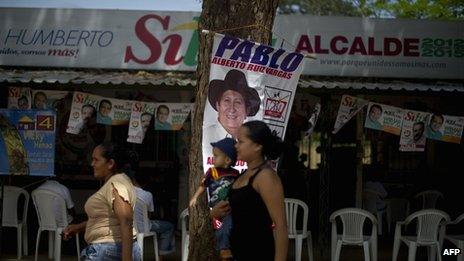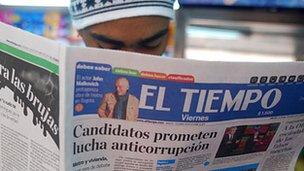Colombia's illegal groups cast shadow over local polls
- Published

Some 31 million Colombians are eligible to vote in Sunday's elections
Death and politics tend to go hand in hand in Colombia, and the run-up to local and regional elections due on Sunday has proved no exception.
Forty-one candidates have been killed during the campaign, twice the number murdered during the last local polls four years ago.
And in the run-up to the polls, rebels from the Revolutionary Armed Forces of Colombia (Farc) have also stepped up their attacks, including killing 20 soldiers last weekend.
To counter the violence, the government is deploying more than 300,000 soldiers and police officers on election day: that amounts to three for every candidate for governor, mayor or those hoping for a seat on the council in one of Colombia's 1,102 municipalities.
But for many observers, violence is not the only threat.
"The risks associated with violence have actually decreased (from 2007), because illegal armed actors such as Farc and Bacrim (drug gangs) have lost some ground," Felipe Jimenez from Electoral Observation Mission, a non-governmental organisation (NGO), told the BBC.
"But the risk of fraud is bigger than ever," he said.
Mr Jimenez said political violence is just one of the many ways the illegal groups are trying to unduly influence the outcome of the elections.
Threats, vote-buying, illegal financing of campaigns and the corruption of electoral officials are also part of the toolkit.
"Even the Farc have realised the importance of political influence at the local level," said Mauricio Romero, of the Bogota-based think tank Nuevo Arcoiris.
"In some places, they will not try to boycott the polls, as in the past, but they will try to influence its outcome," he told the BBC.
The infiltration of Colombia's political institutions by illegal groups - be they rebels, drug cartels or paramilitaries - is not a new phenomenon.
And it has always been more widespread in local politics.
Money trail
"The criminal bands, the former paramilitaries, the guerrillas, they try to capture regional politics to facilitate their illegal trade," said Marcela Prieto, from the Institute of Political Science Hernan Echavarria, another local think tank.
But, increasingly, they also want to tap in the growing resources available to local authorities, who receive royalties for the exploitation of natural resources such as oil, coal and gold.
"The municipalities that are more at risk are those that are set to receive more royalties or those where there has been a mining-energy boom," Mrs Prieto explained.
Mr Romero concurs.

The campaign has seen promises to fight corruption
He says the paramilitaries first became involved in local politics mainly to strengthen their fight against the Farc, but then "came to realise that local politics is a huge business".
"They discovered the royalties, they discovered the transfers municipalities receive to fund the local health system, they realised they could divert the money available for investment by favouring certain private contractors.
"And the bounty is now much bigger, because the country is richer," Mr Romero told the BBC.
Local authorities also have access to funds sent by the central government to repair damage caused by the floods and rain that ravaged large areas of the country earlier this year.
And they will have a very important role to play in the process of land restitution to the victims of the Colombian conflict.
Given this, the national authorities are trying to tackle the potential infiltration of local councils and misappropriation of money.
Working with several NGOs, they have identified the municipalities most at risk and more than 13,000 candidates who are linked with "dubious interests".
Many analysts believe this does not go far enough.
But they agree that, to sort out such an ingrained problem, acceptance is the first step.
- Published19 July 2011
- Published18 June 2011
- Published25 April 2011
- Published29 August 2013